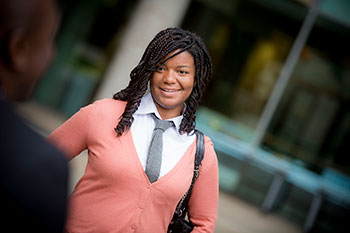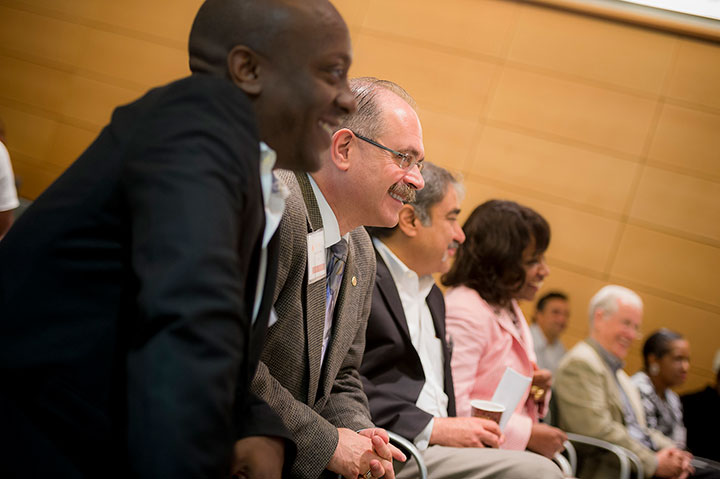Conference for African-American Researchers in Mathematics Connects Students to Mentors
By:
- Catherine Hockmuth
Published Date
By:
- Catherine Hockmuth
Share This:
Article Content

Lauren Crudup. Photos by Erik Jepsen/UC San Diego Publications
For Lauren Crudup, a third-year bioengineering student at the University of California, San Diego, the Conference for African-American Researchers in the Mathematical Sciences (CAARMS) presented a unique opportunity to learn just how applicable mathematics is in the real-world—especially compared to the pure mathematics she learned in high school and earlier undergraduate courses.
“My first introduction to applied mathematics was in Professor Todd Coleman’s bioengineering 100 class,” said Crudup. “This conference is an extension of that and gives me an opportunity to see how those concepts apply to what I’m studying in bioengineering.”
That’s a major point of CAARMS, according to Coleman who hosted the 19th annual conference, which made its debut on the UC San Diego campus July 24-26. The conference was created in the early 1990s when Princeton Professor William Massey, then a scientist at Bell Laboratories, envisioned an organization devoted to addressing critical issues involving African-American researchers and graduate students in the mathematical sciences, which includes researchers in both pure mathematics and applied mathematics such as information technology, banking, neuroscience and engineering.
Attendees included elite researchers in the mathematical sciences from academia, government and industry from around the nation. Students from high school to graduate school as well as postdoctoral scholars also participated.
“Exposure to diverse ideas and perspectives is an important component of academic and personal growth,” said UC San Diego Chancellor Pradeep K. Khosla, who gave remarks as the conference kick off. “Each of you brings a unique background, perspective, expertise and way of thinking. And that’s exactly what we need to address today’s global challenges,” Khosla said.
UC San Diego has a number of programs designed to develop the pipeline of talented students from all backgrounds who go into careers in science, technology, engineering and mathematics (STEM). The Jacobs School of Engineering’s IDEA Student Center, for example, reaches out to K-14 students in order to raise awareness about STEM careers. One of the aims of the Center is to ensure that UC San Diego engineering students reflect California’s diverse communities.
According to CAARMS, of the 1,430 mathematical sciences Ph.D.s awarded in 2008-2009, just 2.5 percent were awarded to self-identifying African-Americans. UC San Diego’s support of the conference is one of many initiatives to mitigate this disparity.
“The IDEA Center has a very important mission to diversify the STEM pipeline,” said Albert P. Pisano, incoming dean of the Jacobs School of Engineering, who begins his term on Sept. 1, 2013.
It was through the IDEA Student Center that bioengineering student Lauren Crudup was first introduced to Todd Coleman. Calling Crudup an exceptional student, Coleman said he was grateful to have her join his research laboratory this year. Coleman said the Conference is a great opportunity to get students excited about the problems that mathematics can solve.

From left, Bioengineering professor Todd Coleman; Albert P. Pisano, incoming dean of the Jacobs School of Engineering; UC San Diego Chancellor Pradeep K. Khosla; Linda S. Greene, UC San Diego Vice Chancellor for Equity, Diversity and Inclusion; and bioengineering Professor Geert Schmid-Schönbein, attend the Conference for African Americans in the Mathematical Sciences at UC San Diego.
The conference is specifically designed to give African-American undergraduate and graduate students, and postdoctoral fellows, access to this kind of support through mentors working at the top of their game across a broad spectrum of mathematics-related fields. The opportunity was not lost on Crudup, who, as an African-American and a woman studying engineering, is used to not seeing many other women of color in the classroom. “Being the only one is an added incentive to do better,” Crudup said. In addition to working in Coleman’s Neural Interaction Laboratory, Crudup is the incoming vice president of the UC San Diego student chapter of Engineers without Borders.
Amanual Weldermariam, a fourth-year UC San Diego nanoengineering student who is also working in Coleman’s research laboratory, graduated from San Diego’s Hoover High School after his family immigrated to the United States from Ethiopia five years earlier. He said the CAARMS conference is a great opportunity to network and learn from his predecessors.
Coleman’s own experience offers his students a great example. With an academic background in electrical engineering, Coleman was a postdoctoral scholar in computational neuroscience at the Massachusetts Institute of Technology and Massachusetts General Hospital. He joined the faculty of UC San Diego in 2011. His research is focused on developing wearable electronic sensors for wireless health monitoring for a range of applications from prenatal and neonatal care to cognitive impairment and post traumatic stress disorder.
Coleman said the genius of Massey’s conference planning is how well he pulls together researchers working across the broad spectrum of mathematical sciences, a factor Massey highlights himself. “The world of mathematics is much bigger than math departments,” Massey said. “The most exciting research areas in mathematics are the ones that are interdisciplinary.”
In addition to highlighting current research by African-Americans in mathematical sciences, CAARMS encourages historically underrepresented students to pursue work in the field and provides assistance to them as they cultivate their careers. Toward this end, UC San Diego is also making great strides.
Linda S. Greene was appointed last January as UC San Diego’s first Vice Chancellor for Equity, Diversity and Inclusion to lead the development of a diversity strategic plan. Meanwhile, the campus has been making steady progress in increasing its applications and acceptance rates from historically underrepresented students. For Fall 2013, UC San Diego saw a 10.9 percent increase in freshman applications from underrepresented students.
“The conference is a symbolic and substantive opportunity for UC San Diego to signal its interest in attracting the talented, yet small pool of African-American mathematicians to our campus as undergraduate and graduate students, postdoctoral scholars and faculty,” said Greene.
“Our universities, our country, and our world will not be the best they can be, will not be as productive as they can be, will not solve the problems of mankind, unless we harness all of the talent,” said Greene. “We have to participate in the development of the pipeline, we have to create the networks that will allow us to harness all the talent.”
“As a bioengineer I am especially sensitive to diversity, since we are trying to serve a diverse society; and I wish to provide a supportive environment to achieve this goal,” said Geert Schmid-Schönbein, professor and chair of the Department of Bioengineering, who spoke at a welcoming reception for the conference. “As a mathematically trained and thinking bioengineer, I am aware of a large number of fantastically challenging mathematical problems in biology that we need a diverse group of mathematicians to get involved in.”
The Conference for African-American Researchers in the Mathematical Sciences is designed to do to just that. As its founder, Massey said students have an important role to play as participants in the increasingly interdisciplinary field of mathematical sciences. Asked for his advice to students in making the most of this opportunity, Massey said, “Think outside the hypercube.”
Sponsorship for the Conference for African-American Researchers in the Mathematical Sciences (CAARMS) included the National Security Agency, the National Science Foundation and UC San Diego’s Office of the Chancellor; Office of the Vice Chancellor for Equity, Diversity and Inclusion; Dean of Graduate Studies; Division of Physical Sciences; Jacobs School of Engineering, led by Interim Dean Juan C. Lasheras; and Jacobs School of Engineering departments of Bioengineering and Computer Science and Engineering.
Share This:
You May Also Like
Stay in the Know
Keep up with all the latest from UC San Diego. Subscribe to the newsletter today.



